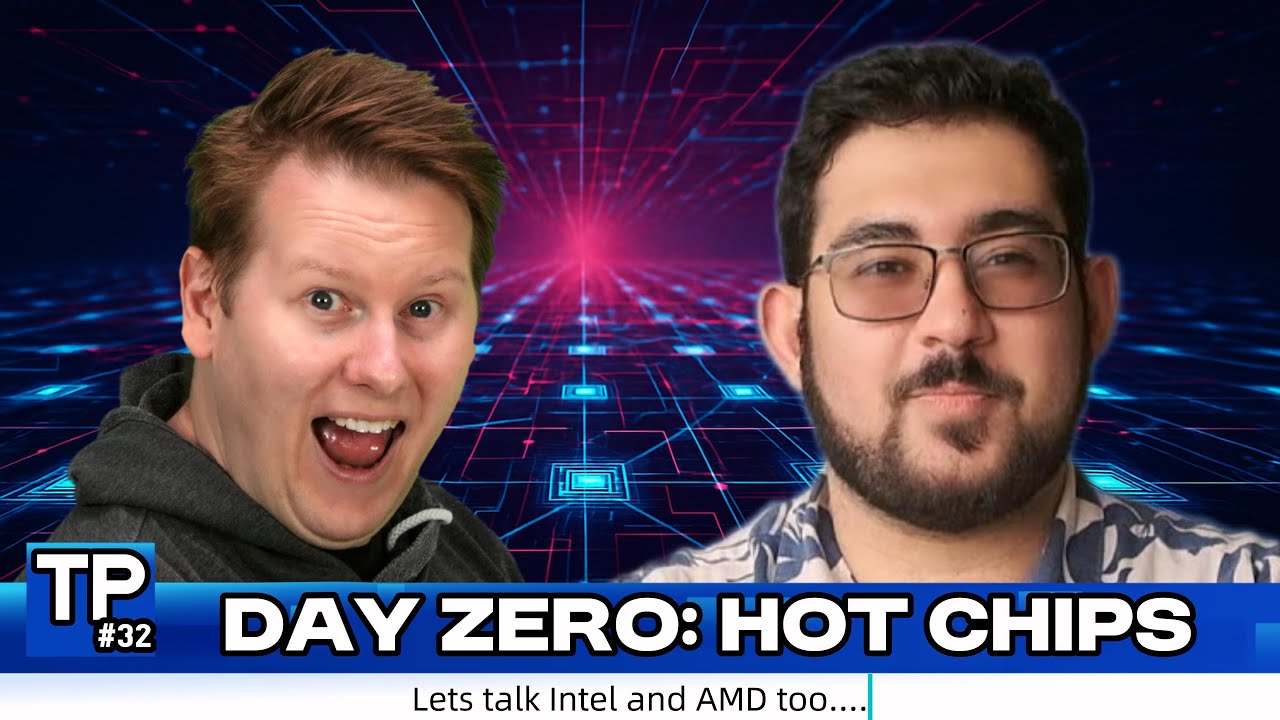The video covers recent developments in the semiconductor industry, including Intel’s strategic investments and government involvement, AMD’s accidental open-source release of FSR4 ML models, GPU smuggling issues highlighted by a Gamers Nexus documentary, and insights from the Hot Chips conference on cutting-edge chip technologies. It concludes with an informal discussion with industry insider Chester, blending technical analysis with personal anecdotes, while encouraging community support for their in-depth semiconductor coverage.
The video begins with a casual and humorous introduction, including a personal anecdote about meeting Emma Watson at an airport. The hosts then dive into the main topics, starting with Intel’s recent developments. Intel has seen significant investment activity, notably SoftBank acquiring a 2% stake through new share issuance, raising questions about potential technical collaborations given SoftBank’s ownership of ARM and other AI chip companies. The discussion covers Intel’s foundry ambitions, the complexities of ARM licensing across foundries, and the geopolitical implications of Intel’s leadership and government involvement. The U.S. government has taken a roughly 10% non-voting stake in Intel as part of the CHIPS Act funding, marking a rare instance of partial government ownership aimed at stabilizing this strategically important company.
Next, the hosts discuss AMD’s recent accidental open-source release of their FSR4 FidelityFX Super Resolution 2.0 ML models and weights on GitHub, which was quickly pulled. This incident sparked debate about AMD’s commitment to open source and the competitive implications of releasing or withholding such technology. The conversation highlights the challenges of balancing proprietary technology with open-source benefits, especially in the context of machine learning-based upscaling technologies competing with Nvidia’s DLSS. The hosts emphasize the value of open source for community-driven improvements and transparency, while acknowledging corporate legal constraints.
The video also touches on a recent Gamers Nexus documentary investigating GPU smuggling into China, which was temporarily taken down due to a copyright strike by Bloomberg. The hosts analyze the legal nuances of fair use and licensing in documentary filmmaking, the challenges of enforcing export controls on high-end GPUs, and the broader implications for the semiconductor supply chain and geopolitics. They commend the investigative effort while noting the complexity of tracking and controlling hardware distribution in global markets.
The hosts then shift focus to the Hot Chips conference, providing an overview of the event’s structure, sponsors, and key presentations. They highlight notable talks on data center rack-scale designs by companies like Google and Meta, new CPU architectures including RISC-V and IBM Power11, and Intel’s upcoming Clear Water Forest chip with advanced 3D stacking. The conference also features sessions on security, graphics, AI accelerators, and optical interconnects, showcasing the latest innovations and industry trends. The hosts express excitement about the depth and breadth of technical content and the opportunity to engage directly with chip designers and industry experts.
Finally, the video concludes with a candid conversation with Chester, a chip industry insider and contributor to Chips and Cheese. Chester shares insights into his approach to analyzing new hardware, the value of direct interaction with architects, and the challenges of balancing deep technical understanding with practical constraints. The hosts also discuss personal topics such as favorite cheeses and travel experiences, adding a relatable and informal tone to the wrap-up. They encourage viewers to support their content through likes, subscriptions, Patreon, and merchandise, emphasizing the community-driven nature of their work and their commitment to delivering in-depth semiconductor industry coverage.
